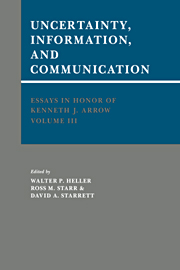Book contents
- Frontmatter
- Contents of Volumes I, II, III
- List of contributors
- Editors' preface
- Kenneth J. Arrow
- Contents
- PART I UNCERTAINTY
- PART II INFORMATION, COMMUNICATION, AND ORGANIZATION
- 7 The cost of communication in economic organization: II
- 8 Assembling efficient organizations?
- 9 Optimal Bayesian mechanisms
- 10 Incentive theory with data compression
- 11 Alternative limited communication systems: centralization versus interchange of information
- Publications of Kenneth J. Arrow
- Author index
10 - Incentive theory with data compression
Published online by Cambridge University Press: 05 November 2011
- Frontmatter
- Contents of Volumes I, II, III
- List of contributors
- Editors' preface
- Kenneth J. Arrow
- Contents
- PART I UNCERTAINTY
- PART II INFORMATION, COMMUNICATION, AND ORGANIZATION
- 7 The cost of communication in economic organization: II
- 8 Assembling efficient organizations?
- 9 Optimal Bayesian mechanisms
- 10 Incentive theory with data compression
- 11 Alternative limited communication systems: centralization versus interchange of information
- Publications of Kenneth J. Arrow
- Author index
Summary
Introduction
The economics of information and of incentives has been one of the most active areas of research in economic theory over the past fifteen years. The origin of this work can be traced to the writings of Marschak in the 1920s and, beyond that, to von Hayek and other European authors. During the development of this theory, the nature of the problems studied has steadily evolved. The kinds of informational difficulties in complex organizations that captured the attention of early writers were actually far different from the questions to which modern economic theory has provided interesting answers.
A brief digression on the nature of this evolution will help to define our interests more clearly. In the earliest papers, the issue was the design and evaluation of communication processes. The economy was depicted as continually changing. A good system of communication was one that could quickly and accurately disseminate information about its current state. Writers such as von Hayek (1945) wanted to evaluate the price system in this informational role. Emphasis was primarily on the continued flow of new information, and on the transitory character of the state of the economy.
The sort of knowledge with which I have been concerned is knowledge of the kind which by its nature cannot enter into statistics and therefore cannot be conveyed to any central authority in statistical form.
(von Hayek, 1945, p. 524)… an essential part of the phenomena with which we have to deal: the unavoidable imperfection of man's knowledge and the consequent need of a process by which knowledge is constantly communicated and acquired.
(von Hayek, 1945, p. 530)Information
- Type
- Chapter
- Information
- Essays in Honor of Kenneth J. Arrow , pp. 239 - 254Publisher: Cambridge University PressPrint publication year: 1986
Accessibility standard: Unknown
- 2
- Cited by
